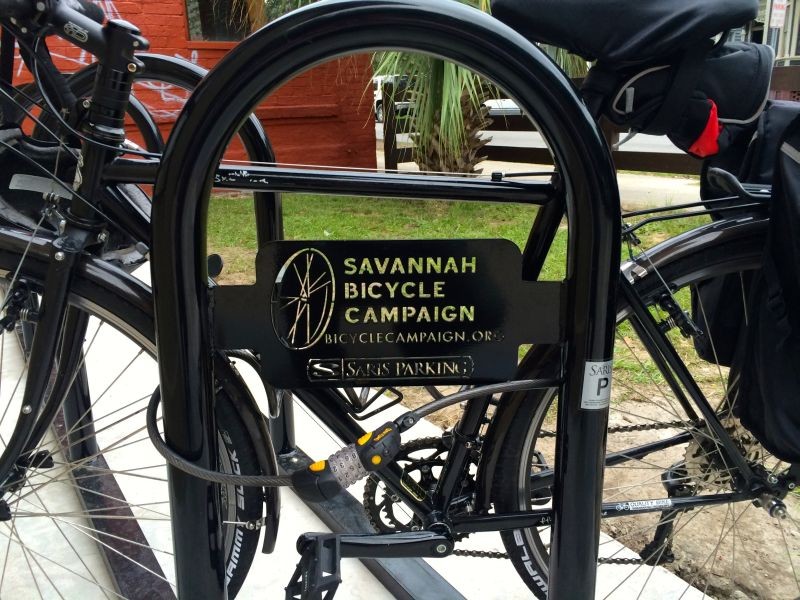WHEN I ASK people what prevents them from riding a bicycle to work, to class or just to get a little exercise, this is the most frequent response by a wide margin: They are concerned about sharing streets with aggressive, distracted or impaired drivers.
What would make them feel more confident? Better facilities, including bike lanes and paths, they say.
A different type of facility, situated at the end of a trip made by bike, can help ease another common worry. Speaking at the Downtown Neighborhood Association meeting on Sept. 17, Capt. Ben Herron of Savannah Chatham Metropolitan Police Department Precinct 2 confirmed that stealing bikes is an increasingly popular activity.
No one in the room was surprised by Herron’s statistics, of course, as having a bike stolen has become a rite of passage in Savannah.

Purchasing a high quality bike lock (and knowing how to use it) is clearly a good way to dissuade thieves. But finding a secure structure to lock to is important, as well.
I shake my head when I see bikes locked to parking meters with cable locks, knowing the bike and lock can be lifted up and away from the meter. Bikes locked to porch or stair railings can be released with a handsaw or a well-placed kick.
The good news is the City of Savannah has installed more than 300 bike racks since 2011. A bike locked to something that cannot easily be compromised may cause a thief to move on to a more vulnerable target.
However the extra security provided by bike racks is only one reason the city has been vigorously deploying racks, according to Dominic Ross, a project manager and analyst with the Department of Mobility and Parking Services.
“Expanding bicycle opportunities in the City of Savannah only contributes more to the department’s mission of creating and maintaining alternative mobility opportunities for residents, businesses, and visitors alike,” he said. “Doing so greatly helps to reduce the demand for on-street and off-street parking.”
Businesses and nonprofits can submit a simple form to request bike racks at their locations. Ross said a number of factors are considered in evaluating new locations, including the amount of space available for installation, the distance to the closest existing bike rack and evidence that bike parking is needed, as indicated by improvised solutions. Ross’ staff looks for trees and poles that show the signs of having had bicycles locked to them.
While poles can be repainted, the damage to trees can be serious.
“There is a high probability that the lock, or key, or bike gears will scratch and damage the tree bark, which is not good for the tree,” said Karen Jenkins, executive director of the Savannah Tree Foundation.
What’s more, “stepping repeatedly around a small diameter tree to lock and then unlock a bike will compact the soil of the root ball, depriving the newly forming roots of the air pockets they need to grow,” she said.
Jenkins recommends seeking out one of Ross’ racks so trees are allowed “to grow peacefully in the tree lawns.”
While bike racks are the most recognizable type of end-of-trip bicycle facility, another amenity has been installed at the Gwinnett Street Kroger store: a self-service bike repair stand featuring bike tools suspended by stainless steel cables.
According to the manufacturer, the station “includes all the tools necessary to perform basic repairs and maintenance, from changing a flat to adjusting brakes and derailleurs.”
Matt Clements, Enmark marketing director, reports the company will soon be installing similar repair stations at selected stores.
“It’s hard not to notice the increased bicycle presence around the city, and we’re always thinking about goods and services that we can add to our locations to attract customers that may not currently be shopping with us. It might seem counterintuitive for a business that sells automobile fuel to promote transportation that does not require gasoline,” Clements said. “But we recognize that there are a significant number of bikers in the city of Savannah and we want to provide services befitting to them.”
While people on bikes will bypass Enmark gas pumps, Clements said, that doesn’t mean they aren’t spending money.
“We hope that when cyclists stop by to tweak their bike, they might also visit the store to pick up a drink or snack. Cyclists are great customers in that they frequently purchase water and other beverages,” he said.
He notes another advantage of encouraging bicycle traffic.
“As an added bonus, their vehicles don’t cause much wear and tear to our lots.”
The first station will be installed in October at the Enmark at 405 MLK Jr. Boulevard.

